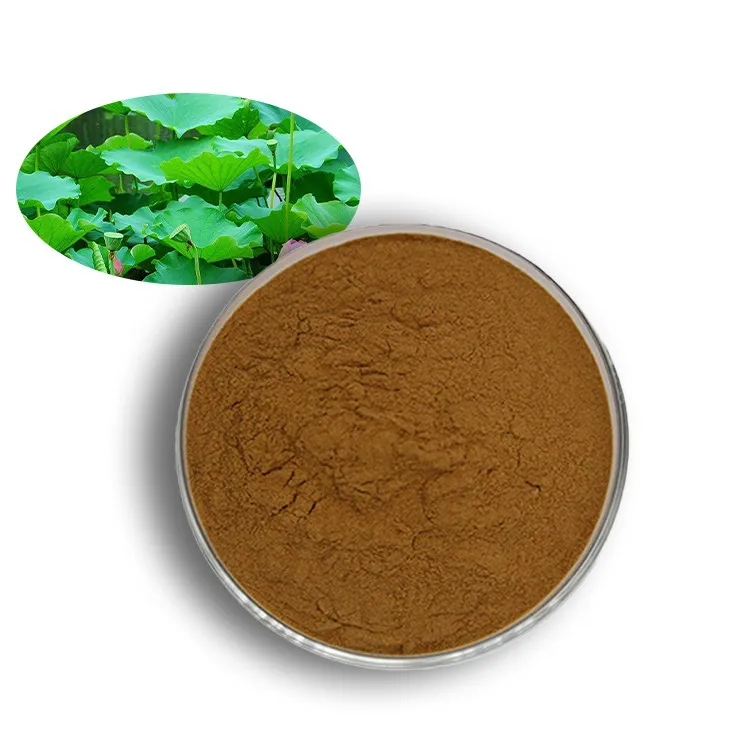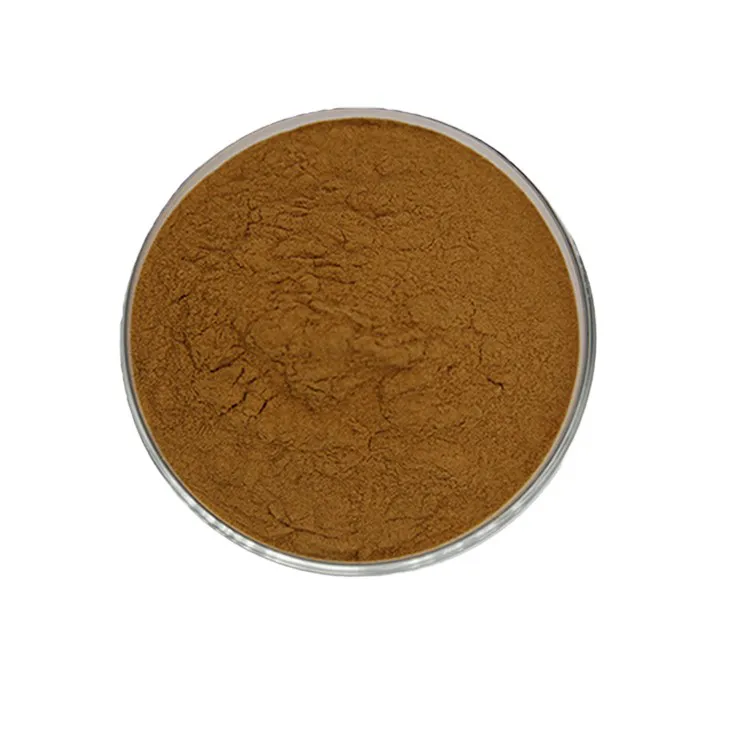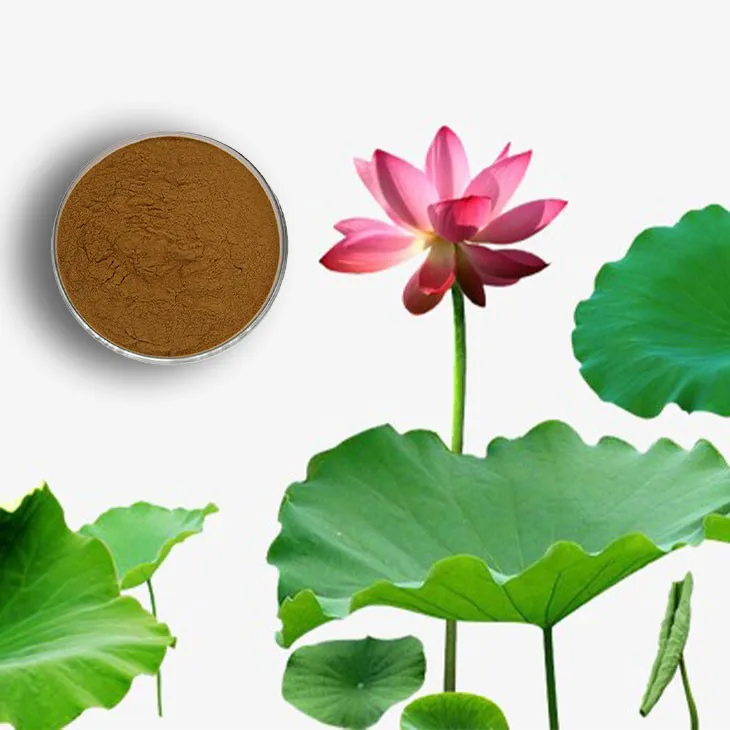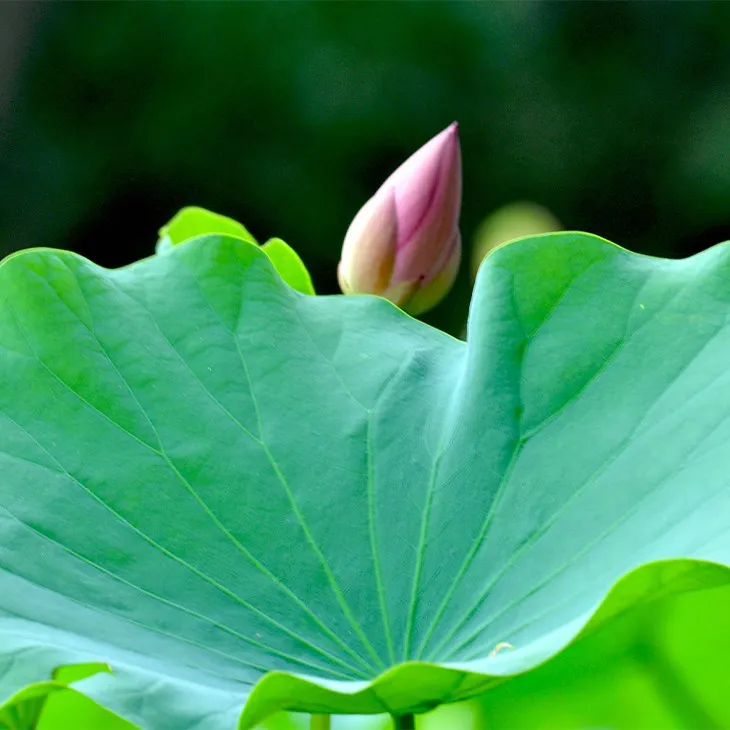- 0086-571-85302990
- sales@greenskybio.com
The Magic of Lotus Leaf Extract Powder: A Comprehensive Guide
2024-11-12

1. Introduction
Lotus leaf extract powder has been emerging as a remarkable substance with a wide range of potential applications. In recent years, it has caught the attention of various industries and researchers alike. This powder is derived from the lotus leaf, a plant that has been revered in many cultures for centuries.

2. The Origin of the Lotus Leaf
The lotus is a water plant that is native to Asia and Australia. It is often found in ponds, lakes, and slow - moving water bodies. The lotus has a long history of cultural significance in countries such as India, China, and Thailand. In Indian mythology, the lotus is associated with creation and purity. In Chinese culture, it is considered a symbol of purity, enlightenment, and rebirth.
The lotus leaf, which is the source of the extract powder, is known for its unique physical properties. It has a waxy coating that makes water droplets bead up and roll off easily, a phenomenon known as the "lotus effect." This natural self - cleaning property has inspired many scientific studies.

3. Composition of Lotus leaf extract Powder
Lotus leaf extract powder contains a variety of bioactive compounds. One of the main components is alkaloids, such as nuciferine. Nuciferine has been studied for its potential effects on the central nervous system. It may have a calming effect and could potentially be used in the treatment of anxiety and insomnia.
Another important group of compounds in the extract powder are flavonoids. Flavonoids are known for their antioxidant properties. They can help to neutralize free radicals in the body, which are unstable molecules that can cause damage to cells. The antioxidant activity of lotus leaf extract powder may contribute to its potential health benefits.
Additionally, the powder contains tannins. Tannins have astringent properties and can be beneficial for the skin. They may help to tighten the skin and reduce inflammation, making lotus leaf extract powder a potential ingredient in skincare products.

4. Potential Health Benefits
4.1 Weight Management
There is some evidence to suggest that lotus leaf extract powder may be beneficial for weight management. Some studies have shown that certain compounds in the lotus leaf can inhibit the activity of pancreatic lipase, an enzyme that is involved in the digestion of fats. By reducing the absorption of fats, it may help in controlling body weight.
However, it should be noted that while lotus leaf extract powder may be a useful addition to a weight - loss program, it is not a substitute for a healthy diet and regular exercise.
4.2 Blood Sugar Regulation
Research has also indicated that lotus leaf extract powder may play a role in blood sugar regulation. It may help to improve insulin sensitivity, which is important for maintaining normal blood sugar levels. This could potentially be beneficial for people with type 2 diabetes.
But more research is needed to fully understand the mechanisms involved and to determine the appropriate dosage for effective blood sugar control.
4.3 Cardiovascular Health
The antioxidant properties of lotus leaf extract powder may contribute to cardiovascular health. Free radicals can damage blood vessels and contribute to the development of atherosclerosis, a condition in which plaque builds up in the arteries. By neutralizing free radicals, the extract powder may help to protect the cardiovascular system.
Moreover, some studies suggest that it may have a mild hypotensive effect, which means it could potentially help to lower blood pressure.

5. Applications in the Cosmetic Industry
Lotus leaf extract powder has found numerous applications in the cosmetic industry. Due to its antioxidant and anti - inflammatory properties, it is often used in skincare products.
5.1 Anti - Aging Products
In anti - aging products, the extract powder can help to reduce the appearance of wrinkles and fine lines. The antioxidants in the powder can prevent oxidative damage to the skin cells, which is one of the main causes of premature aging.
It can also stimulate collagen production in the skin. Collagen is a protein that gives the skin its elasticity and firmness. As we age, collagen production decreases, leading to sagging skin. By promoting collagen production, lotus leaf extract powder can help to keep the skin looking youthful.
5.2 Skin Cleansing and Toning
The astringent properties of the tannins in the lotus leaf extract powder make it suitable for skin cleansing and toning products. It can help to remove excess oil from the skin, tighten pores, and leave the skin feeling refreshed.
It can also be used in acne - prone skin products as it may have antibacterial properties that can help to fight acne - causing bacteria.
6. Applications in the Food and Beverage Industry
In the food and beverage industry, lotus leaf extract powder is used as a natural additive.
6.1 Functional Beverages
It can be added to functional beverages such as herbal teas and energy drinks. In herbal teas, it can enhance the antioxidant content and potentially provide some of the health benefits mentioned earlier, such as blood sugar regulation and weight management.
In energy drinks, it may be used to provide a natural source of energy without the use of artificial stimulants. However, more research is needed to determine the optimal dosage for these applications.
6.2 Food Additive
Lotus leaf extract powder can also be used as a food additive in certain products. For example, it can be added to baked goods or dairy products. In baked goods, it may add a unique flavor and potentially some health benefits. In dairy products, it may help to improve the shelf - life by its antioxidant properties.
7. Potential Environmental Applications
Inspired by the "lotus effect" of the lotus leaf, scientists are exploring potential environmental applications of lotus leaf extract powder.
7.1 Self - Cleaning Surfaces
One area of research is the development of self - cleaning surfaces. By coating surfaces with lotus leaf extract powder or substances inspired by it, it may be possible to create surfaces that are resistant to dirt and water. This could have applications in architecture, for example, on the exterior of buildings to reduce the need for frequent cleaning.
It could also be used in the manufacturing of household items such as kitchenware and bathroom fixtures to keep them clean with less effort.
7.2 Water Purification
There is also some research into the use of lotus leaf extract powder for water purification. The tannins in the powder may have the ability to bind to certain pollutants in water, such as heavy metals. This could potentially be used as a natural and cost - effective method for purifying water in certain situations.
8. Safety and Precautions
While lotus leaf extract powder has many potential benefits, it is important to consider safety and precautions.
As with any supplement or new ingredient, it is advisable to consult a healthcare professional before using lotus leaf extract powder, especially if you have pre - existing medical conditions or are taking medications.
There may also be potential side effects, although these are not well - documented at present. Some people may experience mild digestive discomfort or allergic reactions.
9. Conclusion
Lotus leaf extract powder is a fascinating substance with a wide range of potential applications. From its origin in the lotus leaf, a plant with rich cultural significance, to its diverse composition of bioactive compounds, it offers many possibilities in the fields of health, cosmetics, food, and the environment. However, more research is needed to fully understand its mechanisms of action and to ensure its safety and effectiveness. As research continues, we can expect to see even more innovative uses of this magical powder in the future.
FAQ:
What is lotus leaf extract powder?
Lotus leaf extract powder is a substance obtained from lotus leaves through extraction processes. It contains various bioactive compounds that are believed to have certain beneficial properties.
What are the main components of lotus leaf extract powder?
It typically contains flavonoids, alkaloids, and phenolic acids. These components are thought to contribute to its potential effects, such as antioxidant and anti - inflammatory properties.
How can lotus leaf extract powder be used in the health field?
In the health field, it may be used as a dietary supplement. Some studies suggest that its antioxidant properties could potentially help in reducing oxidative stress in the body. It may also have a role in managing weight as it might affect metabolism, although more research is needed in this area.
Is lotus leaf extract powder used in the beauty industry?
Yes, it is used in the beauty industry. Its antioxidant properties are beneficial for skin health. It may help in reducing signs of aging, such as wrinkles, by combating free radicals. It can also be used in hair care products as it may promote healthy hair growth.
Are there any potential side effects of lotus leaf extract powder?
While generally considered safe for most people when used appropriately, some individuals may experience side effects such as digestive discomfort. Pregnant or breastfeeding women should consult a healthcare provider before using it, as its safety in these situations has not been fully established.
Related literature
- The Bioactive Compounds in Lotus Leaf Extract and Their Health - Promoting Effects"
- "Lotus Leaf Extract: A Promising Ingredient in Cosmetics"
- "Potential Applications of Lotus Leaf Extract in Dietary Supplements"
- ▶ Hesperidin
- ▶ citrus bioflavonoids
- ▶ plant extract
- ▶ lycopene
- ▶ Diosmin
- ▶ Grape seed extract
- ▶ Sea buckthorn Juice Powder
- ▶ Beetroot powder
- ▶ Hops Extract
- ▶ Artichoke Extract
- ▶ Reishi mushroom extract
- ▶ Astaxanthin
- ▶ Green Tea Extract
- ▶ Curcumin Extract
- ▶ Horse Chestnut Extract
- ▶ Other Problems
- ▶ Boswellia Serrata Extract
- ▶ Resveratrol Extract
- ▶ Marigold Extract
- ▶ Grape Leaf Extract
- ▶ blog3
-
High purity olive leaf extract
2024-11-12
-
Lavender oil extraction method
2024-11-12
-
100% organic virgin sea buckthorn fruit oil
2024-11-12
-
Lotus leaf extract powder factory in China
2024-11-12
-
China aged garlic extract supplier
2024-11-12
-
Deer antler extract powder manufacturer
2024-11-12
-
Saw palmetto extract vs whole herb
2024-11-12
-
Phyllanthus Emblica Extract
2024-11-12
-
Kelp Extract Powder
2024-11-12
-
Lotus leaf extract
2024-11-12
-
Pomegranate Extract
2024-11-12
-
Plantain extract
2024-11-12
-
White Peony Extract
2024-11-12
-
Carrageenan Extract Powder
2024-11-12
-
Agaricus Blazei Extract
2024-11-12
-
Maitake Mushroom Extract
2024-11-12
-
Apricot Powder
2024-11-12




















